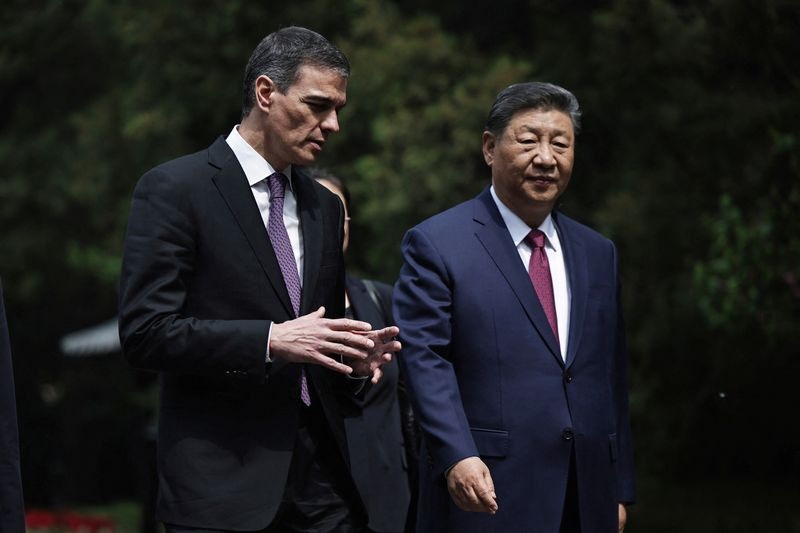China: Beijing's Bid for European Partnership in the Age of Tariffs
As the world's two largest economies clash, the EU finds itself at a crossroads, navigating potential opportunities for deeper engagement with China while grappling with concerns about trade imbalances and the indirect consequences of US tariffs. Will this strategic realignment foster a more stable and cooperative international economic system, or merely intensify geopolitical divisions and protectionist tendencies?
CHINAEUROPEAN UNION
Zlata Drazdova
6/12/20253 min read


The Trump administration’s second term began with global changes. The US President implemented harsh tariffs of 10% on nearly all foreign imports to the US. However, not all countries are equally affected. The United States announced a 20% tariff on all European Union imports and a 25% tariff on all car imports, significantly impacting Germany, the world’s largest automobile exporter. The heaviest tariffs were faced by China. Donald Trump imposed new import taxes of up to 145% on goods from the world’s second-largest economy.
The Chinese Foreign Ministry responded, “The US side is still imposing extreme pressure on China by imposing tariffs indiscriminately. China firmly opposes and will never accept such arrogant and bullying behavior. If the US really wants to solve the problem through dialogue and negotiations, it should show an attitude of equality, respect, and reciprocity. If the US disregards the interests of both countries and the international community and insists on waging a tariff war and trade war, China will definitely retaliate.” Just a few hours after the statement, China announced it would impose 84% tariffs on US goods. Later, Beijing hit back by raising tariffs on US goods to 125%, adding more American companies to its export control list and unreliable entity list, and restricting the export of critical minerals used in everything from iPhones to missile systems.
Moreover, Chinese President Xi Jinping urged the EU to join China in defending globalization and opposing unilateral acts of bullying. That was a clear swipe at renewed US tariffs under President Donald Trump. Beijing is now seeking to mend strained relationships with the EU to weather the trade war with the US.
During a visit by the Spanish Prime Minister to Beijing, Pedro Sánchez said there were opportunities for China and the EU to deepen their ties. But he emphasized that China must be sensitive to European demands for a more balanced relationship. Spanish officials have rejected US warnings that a pivot to China would be “cutting their own throat.” Instead, Sánchez appears to be positioning Spain as an interlocutor between China and the EU. Recent developments show both sides are increasing coordination.
Xi Jinping called on the EU to jointly safeguard fairness and justice and oppose unilateral bullying, describing their relationship as one of the world’s most influential. China also said it would welcome visits by European Council President António Costa and European Commission President Ursula von der Leyen at an appropriate time to hold a new round of leaders’ meetings.
China and the EU are planning to hold high-level dialogues on strategy, economy and trade, green development, and digitalization among a series of events this year, Chinese Foreign Ministry spokesperson Lin Jian announced at a press conference. He also confirmed that China and the European Parliament had agreed to facilitate mutual exchanges.
These comments follow China’s decision to lift sanctions against five EU Parliament members. The sanctions were imposed in 2021 over Western measures against Chinese officials accused of the mass detention of Uyghur Muslims in Xinjiang. The EU has hailed the move as a step in restoring parliamentary dialogue with China. Beijing’s efforts to seek closer relations coincide with improving trade relations as the two sides agreed to look into setting minimum prices on electric vehicles.
However, the EU remains somewhat hesitant in dealing with China. This is evident in a recent debate among EU member states. While some advocate for easier trade with China, others express concerns about the prospect of Chinese imports as an indirect consequence of US tariffs.
Amid this rapidly evolving situation, Europe needs to maintain a cool mind and constructive approach toward China. Typical US rhetoric portrays China as a common rival to both the US and Europe, ultimately serving the interests of the US while positioning Europe as merely a stepping stone in Washington's China containment strategy. Unwarranted fears of China will not help Europe address the dilemmas it faces, especially when the US is turning the screws on the whole world. The joint support for open trade and globalization by China and Europe is particularly vital as the US abuse of tariffs is causing severe disruptions to the global trade order. "There is no direct clash of interest between China and Europe at the strategic and security level. Both are advocates for multilateralism and global governance. Cooperation between China and Europe now carries more weight and will be of greater value," said Xin Hua, director of the Center for European Union Studies at Shanghai International Studies University.
They now need to show their readiness to make progress towards a fair and balanced ocean. Additionally, the 50th anniversary of diplomatic ties between China and the European Union highlights one of the most influential bilateral relations in the world, contributing greatly to enhancing the well-being of their people and promoting world peace and development. So by collaborating, they can stabilize the global economy, counter US pressures, and create a more stable and cooperative international system.


